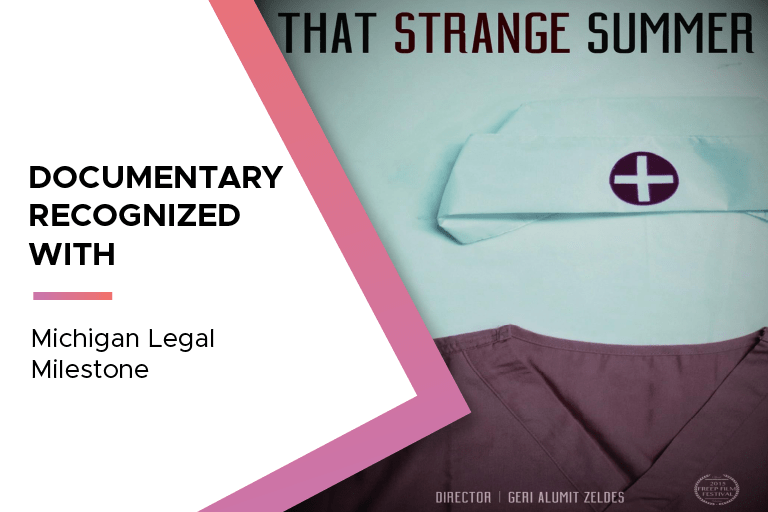A decade after its debut, That Strange Summer — a student-collaborative documentary directed and produced by Michigan State University journalism Professor Geri Alumit Zeldes — will be honored this August with a Michigan Legal Milestone. The recognition, marked by a permanent plaque at the Philippine Community Center of Michigan in Southfield, cements the film’s role in resurfacing a buried chapter of Michigan’s legal and cultural history.
‘That Strange Summer’
The film revisits a chilling 1975 case in which two Filipino nurses, Filipina Narciso and Leonora Perez, were falsely accused of injecting patients with a lethal drug at the Veterans Administration Hospital in Ann Arbor, MI. Convicted by an all-white jury — but never retried after the court cited prosecutorial misconduct — the women were ultimately released. Their story, largely forgotten by the public, sparked powerful activism in the Filipino American community.
Zeldes said she felt like she should have known about the case prior to learning about it through an MSU colleague in 2011. After all, she grew up near Ann Arbor and attended the University of Michigan as an undergraduate student. “And I’m Filipino,” she added. “I felt like this is something that needs to be explored, because there's a huge gap in Filipino history in general.”
That disconnect became her calling. “With a lot of documentary film ideas, my self-test is, ‘if it keeps me up at night.’ And that story kept me up for months.”
Video: Trailer for That Strange Summer (2016), a documentary which earned a Merit Award for Best Independent Producer from the Michigan Association of Broadcasters, Award of Excellence from the Broadcast Education Association, regional Emmy® in the Documentary Cultural Category, national Radio Television Digital News Association Unity Award, and a Michigan Legal Milestone in 2025. Courtesy of Geri Alumit Zeldes, on Vimeo.
Real-world classroom
Zeldes didn’t take on the project alone. She created an ad and recruited a team of MSU students across a variety of undergraduate and doctoral programs. While some worked on the project as an independent study with Zeldes, none had experience in documentary filmmaking prior to joining the crew.
“We were all kind of learning together,” Zeldes said. “I like to say documentary filmmaking is a team sport.”
Creating a documentary about a case that happened decades ago delivered its fair share of obstacles. The crew was unable to conduct interviews with several individuals who were instrumental to the case as some were deceased, unable physically to grant an interview, had moved away or simply did not wish to be filmed.
“The biggest barrier, and what took me so long, was I was trying to get interviews with the nurses,” Zeldes said. “And for different reasons, the nurses refused the interviews, so it became almost impossible to tell this story. I had to pause a lot. There were so many twists where I thought I was going to get the nurses in the film.”
Despite these challenges, Zeldes and her team pushed forward — relying on archival footage, FBI agent interviews and journalist accounts to piece together a remarkable story.
Throughout the years the project was in production, the student crew helped Zeldes research the case, conduct interviews and design the film’s website. Some students even graduated in the process and returned to see the finished product.
The film premiered at the Detroit Film Festival in 2016 to an audience filled with members of the Filipino American community, journalists, members of the criminal justice community — and, of course, Zeldes’ students and their families. Since then, it has become part of the Asian Studies curriculum at institutions like the University of Michigan and Princeton.
“It still has life,” Zeldes said. “There are some individuals who I am super indebted to for keeping the film relevant.”
Storytelling that matters
Now, thanks to the advocacy of community members like Roland Hwang, That Strange Summer will be commemorated as a Michigan Legal Milestone — joining a statewide program that recognizes defining moments in legal history through permanent public displays. Hwang is a former Assistant Attorney General Michigan and chaired the Michigan State Advisory Committee to the U.S. Commission on Civil Rights.
“It’s groundbreaking. It allows this case to resurface and have an edge, especially in the local history of Michigan,” Zeldes said. “In a lot of ways, the Filipino community was the heroine here. They organized. They were able to get allies from across communities to help free the nurses. It’s a great example of community activism that we should all be proud of in the Filipino community.”
For Zeldes, the honor also affirms something deeper about the value of telling stories, especially when students are part of the process.
“Experiment with the structure of the storytelling,” she advises students. “And it's really helpful to build a community of filmmakers where you can test out drafts of the film and get comments and feedback. Something that I’ve had to develop is getting more feedback — and the more used to that you are, the better the story will be.”
You never know when your work will help rewrite the record.
By Jessica Mussell
Read ‘The Birth of That Strange Summer’ on MSU Today
Bachelor of Arts in Digital Storytelling
Bachelor of Arts in Journalism
